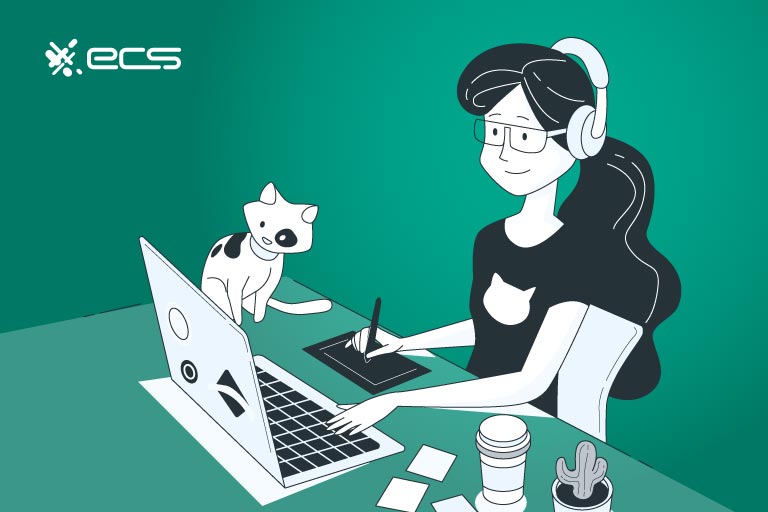How do freelancers accept payment and get paid? It’s not a 1099 job, and cash certainly isn’t the answer. With 73.3 million freelancers in the United States, this form of income has become increasingly popular. Especially for those with marketable skills who want more freedom and opportunity than a typical 9 to 5 job may offer. But It can be tough to find the right payment processing for freelancers.
The Increasing Demand For Freelance
Recent trends, including work-from-home initiatives implemented by many businesses, have opened the doors to freelancing opportunities. Freelancers can now easily work from home and supplement a company’s workforce more seamlessly than ever before.
This has put freelancers in high demand in almost every industry, and many freelancers have turned to online freelance job sites to find work. Sites like Upwork, Fiverr, and others have become increasingly popular with freelancers in this new market.

The Downside To Freelance Platforms-Cost
While these can be great for finding work quickly, they have a rather drastic downside, and that’s the fact that most of these services charge anywhere from 10% to 20% of your total earnings to use the platform.
If you land a freelance job that pays you $50,000 for the year, you could pay $10,000 in fees to the platform. It’s simply too much money to lose right off the top of your earnings. Not only that, but such a massive cut from your earnings also likely impacts how much you can save and invest. Therefore, the total amount you lose over your career can balloon.
But what if there was a better way? Could you still freelance but pay as little as 1.5% per job in payment processing fees? Could you have more control and security over your freelance business?
Below, we’ll explain how freelancers can enjoy these incredibly low fees by handling their own payment processing and invoicing. It’s far easier than you think and can save you tens of thousands of dollars a year.
Upwork And Other Freelance Fees
While Upwork is not alone in this, freelance boards charge ridiculous fees for you to use them as a payment processor. The freelance boards provide very few services to most freelancers, at least in comparison to the fees they charge.
Freelancers have to find their own jobs, negotiate with clients, and handle all of the logistics of delivering the work requested to their clients. In the end, freelance job boards work as payment processors.
Some freelancers may feel that the added security of being able to dispute non-payment from clients to be worth it. How often does that come up? It’s a small fraction of clients that refuse to pay. But, a freelancer will pay exorbitant fees for every job.
Processing Your Payments As A Freelancer
Most freelancers have considered doing their own payment processing for clients and saving all those fees. But often, freelancers may think the process is too complicated, or they may need help figuring out where to start.
But processing your own payments can be very easy. Most freelancers can start invoicing their clients using their payment processing solution in less than a few days. No coding or technical knowledge is required, so any freelancer in any industry can start doing this.
You simply have to follow a few steps, and you can start saving thousands of dollars a year. So instead of going towards fees, that money goes straight into your bank account.
Below, we’ll explain how to accept payment as a freelancer using your own merchant account.

Choosing A Payment Processor
You will need to choose a payment processor to handle your invoicing and payments as a freelancer. A payment processor is a company such as ECS Payments that offers merchant accounts to individuals and businesses.
A merchant account allows you or any business to process credit cards for online payments, ACH payments, or checks electronically. Once you have a merchant account, you can accept credit cards from clients to pay their invoices or use ACH (Automated Clearing House) to receive payments. These work like bank transfers or wire transfers and are often better suited for recurring payments or larger transactions. These ACH money transfers also have lower transaction fees.
How Do Freelancers Get Paid?
Most clients on freelance job boards fund their accounts and pay freelancers via credit cards or ACH anyway. So if you use your own payment solution, there is no change for your clients at all. They simply process their credit cards with you directly instead of through the freelance job board. The form of payment your clients use will remain exactly the same.
Aggregate Merchant Accounts
You’ve likely heard of popular payment systems like Square or Paypal offering freelance payment methods. The problem is that payment options for freelancers do not provide you with a dedicated merchant account. Instead, they are aggregate merchant accounts.
They pool all their customers together and process payments through their one main merchant account. There is little difference between this and collecting payments through a job board.
With an aggregate payment processor, you still don’t control your payment system. You can also be locked out or banned. Something we’ll touch on in a later section regarding the downsides of aggregate payment processors for freelancers
What To Look For In A Freelancer Payment System
There are specific areas of freelance payment processing that you want to focus on. Since you aren’t selling products, your payment terms and how you bill clients will differ from a typical merchant who runs a retail store eCommerce site.
Below we’ll go over key areas to be aware of so you can find the best way to get paid as a freelancer using your own merchant account and processing.

Customer Service
Customer service should be a top priority for freelancers because most want to avoid dealing with any technical hassles associated with payment processing.
With a dedicated merchant account through a company like ECS Payments, freelancers can access dedicated customer support personnel who know your account and your freelance business. They can answer your questions immediately and offer personalized service that other payment systems like Stripe or Paypal simply can’t provide.
Powerful Invoicing Tools
As a freelancer, much of your payment workflow will likely revolve around invoicing. Most freelancers don’t realize that personalized merchant accounts can come with powerful invoicing features that make collecting payments easy for them and their clients.
Merchant accounts from a trusted payment processor will offer access to various payment gateways. A payment gateway for freelancers is the network used to process payments. These networks each have various tools for freelancers, such as invoicing options and the ability to store customer billing information on the network’s server.
Aggregate payment processors like Stripe or others do not offer any choice of gateways. Merchants have to use their default gateway. They also brand many of their tools with their company logo and advertisements. With your own merchant account, you can easily brand your entire payment workflow for a more professional look and feel.
If you already use bookkeeping or accounting software to manage clients and invoicing, ECS Payments can offer gateways that integrate with the most popular programs. Using this integration, you can send invoices directly from your favorite bookkeeping software or use the gateway tools to create an invoice.
These invoices have payment links that take clients to a secure page where they can pay freelancers online. They also offer different payment methods for freelancers, like ACH or debit cards, allowing even more flexibility.
Other tools, such as storage for customer billing information, allow fields to be auto-populated so repeat clients don’t have to enter information to complete payment.
The secure payment gateway stores all information from the credit card network. There are no security or technical concerns for you as a freelancer.
If you want to learn more about these powerful tools available to freelancers, contact ECS Payments and speak with one of our payment experts.
Low Fees
You may already know the fees from sites like Upwork are already ridiculous. So you want to choose a payment processor with the lowest fees possible for your industry and freelance situation.
Aggregate payment processors lump everyone into the same category, so there are fixed rates for everybody. You may receive better overall rates and lower lifetime costs by using your own merchant account.
Processing volumes and risks all affect the total fees you pay. As a freelancer, you may be considered low-risk by the credit card industry. Meaning you can have lower costs than you would through other payment systems like Paypal.
When freelancing is your full-time income, even a slight cost reduction adds up over time and can quickly save you thousands of dollars. By taking advantage of lower fees, you’re earning more money without doing any extra work or finding new clients.
Finding lower processing costs is a great way to fight inflationary pressures. Something every business and freelancer is currently dealing with.

Setting Up Your Website For A Freelance Business
If you plan on moving a portion of your freelance business away from sites like Fiverr or Upwork, you will likely need a website. Although, you don’t necessarily need a website for all types of freelance work.
However, an informational website showing off your skills, credentials, and portfolio is a good idea.
A benefit of having a website is that potential clients can ask you for cost quotes using either a generic contact form or a quote calculator if you offer specific services or a fixed hourly rate depending on the type of work.
Building a Website
If you’re unfamiliar with building websites, a good option is to use a web-building platform. The most popular ones are sites like Wix, Squarespace, and Weebly.
The popular blogging platform WordPress also offers a similar service. Although, it requires some WordPress knowledge if you want to jump in and have a site up and running quickly.
For those with no experience in websites, one of the other platforms mentioned would likely be better. They have pre-made templates for most freelancers and tools for adding contact forms, portfolios, and additional information to help freelancers land clients.
You can also pay someone to create a website for you. This is the most expensive option, but it also requires the least amount of time and effort on your part. One downside of going this route is that for any updates to the site, you’ll likely have to pay someone to do it since you won’t be familiar with how to make the site or the backend.
One option to mitigate that issue is to pay someone to build a site on one of the platforms, such as Squarespace or Wix. Once created, you can then make small changes on your own using the platform tools.
This is a strategy many freelancers use when they want their site built by a designer but then still be able to update it themselves, either by adding photos and videos or updating their resume page and experience.
You can also integrate your merchant account with your website if you need to accept payments directly on your site for any services you offer.
Downsides Of Using Aggregate Merchant Accounts For Freelancing
We touched on aggregate merchant accounts earlier, which are offered by payment processors such as Paypal or Square and many others who advertise heavily online.
While these may be easy to set up at first and often have almost no approval process, the initial convenience quickly wears off when merchants realize they have little control over their own payment processing.
This lack of control can lead to many problems and even threaten businesses’ or freelancers’ livelihoods.
Below, we’ll look at the most common problems when dealing with an aggregate payment provider instead of your own merchant account.
Frozen Funds
Frozen funds are the main issue that most people complain about regarding aggregate payment providers. They can freeze your funds at any time, forcing you into the company’s arbitration or dispute settlement process. This process is highly unfair, used to protect the aggregate payment processor such as Paypal and not the merchant or freelancer.
There are thousands of stories of aggregate payment users who had their funds frozen for months at a time. Sometimes, these users were never able to retrieve those funds. Other times, your processing is frozen until the dispute is resolved.
Worse, most companies work on a “freeze first, ask question later” policy. That means that for any issue, even if you’re not at fault, they freeze the account first, then send you notice.
You can easily avoid this by using your own merchant account through a payment processor such as ECS Payments. With ECS Payments, you own your own merchant account.
With ECS Payments, you can drastically reduce your fees when collecting money from clients and have more control over your money and payment processing than ever before.

Poor Customer Service
Aggregators like Stripe, Paypal, or Square also generally have poor customer service. They are often only available via email or a contact form on their website. It takes anywhere from one to three days to get a response. If you don’t get a suitable answer in their first reply, you need to wait another few days.
It’s just not a great way to do business. Instead, you want a payment processor with dedicated support specialists available by phone. Not only that, they should have both technical and payment experts to answer your questions.
Whether it be implementing various technologies or questions about the payment system itself, you need people with the expertise and availability to answer your questions immediately so you can get back to business.
Unfortunately, payment aggregators don’t offer this level of service. Only your own merchant account through an experienced payment processor can offer this level of personalized customer support.
Reversals Are Common And Are Difficult To Dispute
Since processing with an aggregate processor like Square means you don’t really have your own merchant account, it also means you don’t have a real merchant agreement.
Instead, you have a very one-sided agreement meant to protect Square or the aggregate processor and not you. Meaning they can close your account, freeze funds, or limit your ability to process for almost any reason.
You don’t have to search very far to find stories of merchants who were happily processing payments, then one day they were suddenly deemed too high-risk for reasons that Square or Paypal never fully explained.
They don’t have to explain, as that’s part of their agreement with merchants. Your business is simply at the whim and discretion of a company that pools all merchants together, so there is no individual assessment or remedy when something goes wrong.
Payment Processing For Freelancers: Obtain Your Own Merchant Account
While the above problems with aggregate payment providers may seem scary, the solution is simple. Having your own merchant account with a trusted provider solves all these issues. It puts you in complete control of your funds and payment processing.
You’ll have excellent customer service, a fair merchant agreement that protects you and your business, and the tools needed to save thousands of dollars a year on fees charged by the top freelance boards.
Overall, it’s a win-win for freelancers when they move off platforms like Upwork and instead use their own merchant account and payment processing.
Start Saving Thousands Of Dollars Today With Your Own Merchant Account
If you’re a freelancer ready to keep more money in your pocket instead of giving it away to Upwork or Fiverr, contact ECS Payments and speak with our specialists about payment processing for freelancers.
We offer fast approval and different options to help freelancers in virtually any industry. Whether you need tools for seamless invoicing and payments or recurring and continuity payments, ECS Payments has all the options you need to be a successful freelancer in today’s competitive environment.
Even if you move a portion of your clients to your own payment processing, your savings will more than cover the small amount of time and effort to set up your merchant account. From then on, you’ll be saving money on every new invoice.
Contact ECS Payments today and learn how we can help boost your annual revenue by saving you thousands of dollars on platform fees.
